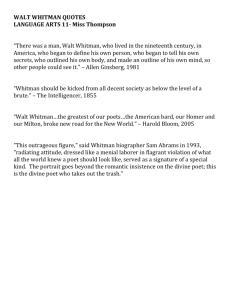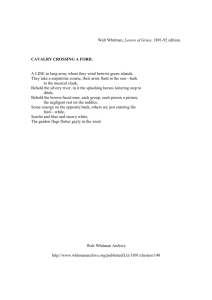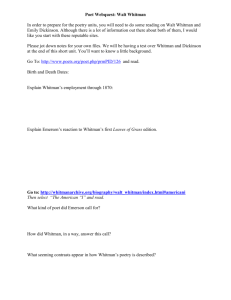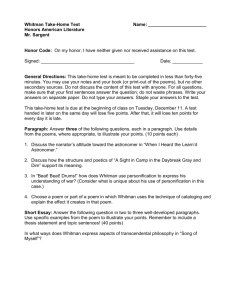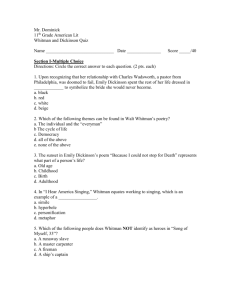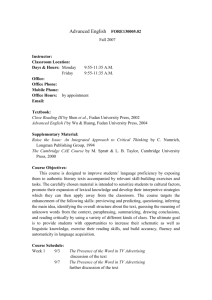Whitman Bio and Questions
advertisement
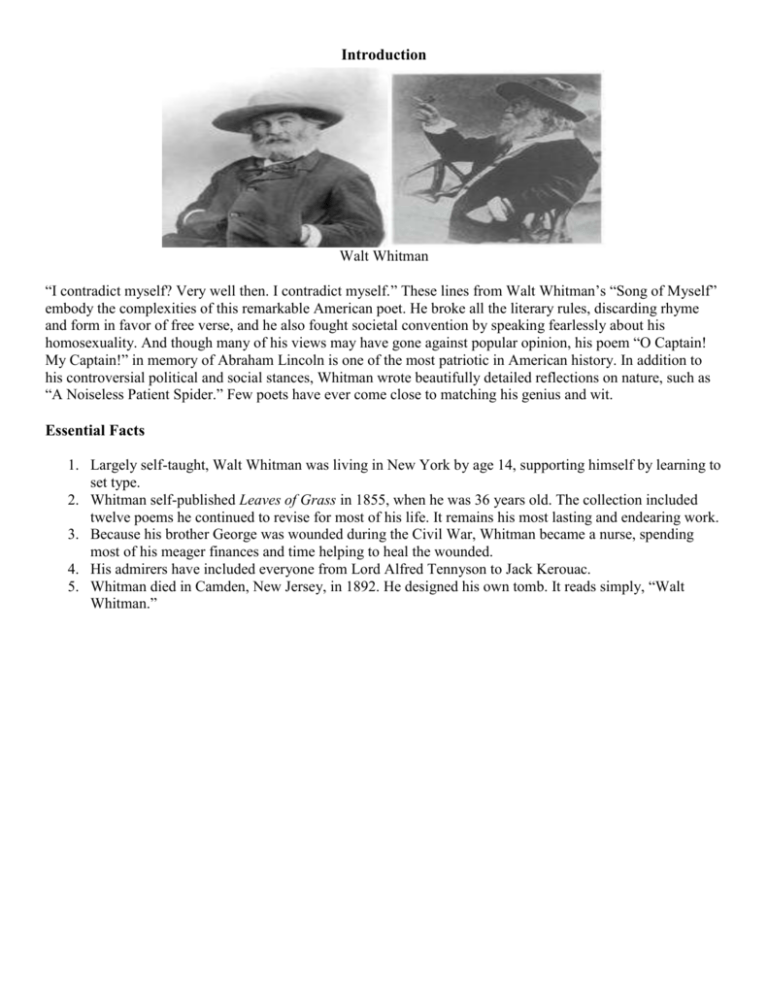
Introduction Walt Whitman “I contradict myself? Very well then. I contradict myself.” These lines from Walt Whitman’s “Song of Myself” embody the complexities of this remarkable American poet. He broke all the literary rules, discarding rhyme and form in favor of free verse, and he also fought societal convention by speaking fearlessly about his homosexuality. And though many of his views may have gone against popular opinion, his poem “O Captain! My Captain!” in memory of Abraham Lincoln is one of the most patriotic in American history. In addition to his controversial political and social stances, Whitman wrote beautifully detailed reflections on nature, such as “A Noiseless Patient Spider.” Few poets have ever come close to matching his genius and wit. Essential Facts 1. Largely self-taught, Walt Whitman was living in New York by age 14, supporting himself by learning to set type. 2. Whitman self-published Leaves of Grass in 1855, when he was 36 years old. The collection included twelve poems he continued to revise for most of his life. It remains his most lasting and endearing work. 3. Because his brother George was wounded during the Civil War, Whitman became a nurse, spending most of his meager finances and time helping to heal the wounded. 4. His admirers have included everyone from Lord Alfred Tennyson to Jack Kerouac. 5. Whitman died in Camden, New Jersey, in 1892. He designed his own tomb. It reads simply, “Walt Whitman.” Walt Whitman (1819–1892) Less than a hundred years after the United States was founded, the new nation found its voice in a poet who spoke to all the world. His name was Walt Whitman, and he struck a note in literature that was as forthright, as original, and as deeply charged with democracy’s energies as the land that produced him. Student of the World Whitman was born on May 31, 1819, to parents of Dutch and English descent. They kept a farm in West Hills, Long Island, in what is today the town of Huntington. His father’s ancestors had come from England only twenty years after the landing of the Mayflower and had settled in Connecticut. On his mother’s side his ancestors were among the early immigrants from Holland who settled on Manhattan Island and along the Hudson River. Whitman and his seven brothers and sisters were able to assume their essential American-ness with an uncommon confidence. They knew their American grandparents, and they grew up in circumstances that allowed them both the communal experience of country life and the urban experience of a new city, Brooklyn, on its way to becoming a metropolis. Here young Walter went to school until he was eleven. He then worked as an office clerk and printer’s assistant, and for a time he taught school. On weekends spent along the beaches and in the woods of Long Island, Whitman read Sir Walter Scott, the Bible, Shakespeare, Homer, Dante, and ancient Hindu poetry. He never became a scholar; he never went to college. Before Whitman was twenty, his feeling for the written word and his fascination with the boomtown atmosphere of Brooklyn led him to journalism. After ten years of that, he took a kind of working vacation—a difficult overland trip by train, horse-drawn coach, and riverboat to New Orleans. There he put his journalistic talent to work for the Crescent and his own talent for observation to work for himself. After a few months he returned to New York by way of the Great Lakes and a side trip to Niagara Falls. By this time, Whitman had added to his limited sense of America the experience of a wilderness surrendering its vastness to civilization. He also had become acquainted with the entirely alien culture that French Catholic New Orleans represented to him. Back in Brooklyn, Whitman accepted an offer to serve as editor of the Brooklyn Freeman. For the next six or seven years he supplemented his income as a part-time carpenter and building contractor. All this while he was keeping notebooks and quietly putting together the sprawling collection of poems that would transform his life and change the course of American literature. The Making of a Masterpiece In 1855, Whitman published his collection at his own expense under the title Leaves of Grass. Since the book was too boldly new and strange to win the attention of reviewers or readers who had fixed ideas about poetry, its publication went all but unnoticed. To stir up interest, he sent samples to people whose endorsement he thought might be useful. One of these samples reached Ralph Waldo Emerson, who at once wrote to Whitman the most important letter Whitman would ever receive: Concord, Massachusetts, 21 July, 1855 Dear Sir—I am not blind to the worth of the wonderful gift of Leaves of Grass. I find it the most extraordinary piece of wit and wisdom that America has yet contributed. I am very happy in reading it, as great power makes us happy. It meets the demand I am always making of what seemed the sterile and stingy Nature, as if too much handiwork, or too much lymph in the temperament, were making our Western wits fat and mean. I give you joy of your free and brave thought. I have great joy in it. I find incomparable things said incomparably well, as they must be. I find the courage of treatment which so delights us, and which large perception only can inspire. I greet you at the beginning of a great career, which yet must have had a long foreground somewhere, for such a start. I rubbed my eyes a little, to see if this sunbeam were no illusion; but the solid sense of the book is a sober certainty. It has the best merits, namely, of fortifying and encouraging. I did not know until I last night saw the book advertised in a newspaper that I could trust the name as real and available for a post-office. I wish to see my benefactor, and have felt much like striking my tasks and visiting New York to pay you my respects. The “long foreground” of which Emerson wrote had not been the careful, confident period of preparation to which many poets devote themselves before they are ready to publish. Instead, it had been a precarious existence. Journalism had kept Whitman going financially, but not even the editorials he wrote for the Brooklyn Eagle had brought him distinction. On the surface at least, his “long foreground” of preparation had been a mixture of hack work and jack-of-all-trades ingenuity. By the time he was ready to declare himself a poet and to publish the first version of his book, Walt Whitman was unique. Leaves of Grass is a masterpiece that Whitman was to expand and revise through many editions. Its process of growth did not end until the ninth, “deathbed” edition was published in 1891, thirty-six years after its first appearance. It is a spiritual autobiography that tells the story of an enchanted observer who says who he is at every opportunity and claims what he loves by naming it. “Camerado,” he wrote, “this is no book / Who touches this touches a man.” In the Crowd, but Not of It The figure we know today as Walt Whitman was conceived and created by the poet himself. Whitman endorsed his image and sold it to the public with a promoter’s skill worthy of P. T. Barnum, the great show manager of the nineteenth century. At first glance that figure is a bundle of contradictions. Whitman seems to have had the theatrical flair of a con artist and the selfless dignity of a saint; the sensibility of an artist and the carefree spirit of a hobo; the blustery egotism of a braggart and the demure shyness of a shrinking violet. On second glance these contradictions disappear: Walt Whitman was everything he seemed to be. The figure he so carefully crafted and put on display was not a surrogate but the man himself. “One would see him afar off,” wrote the great naturalist John Burroughs, “in the crowd but not of it— a large, slow-moving figure, clad in gray, with broad-brimmed hat and gray beard—or, quite as frequently, on the front platform of the street horse-cars with the driver…. Whitman was of large mold in every way, and of bold, far-reaching schemes, and is very sure to fare better at the hands of large men than of small. The first and last impression which his personal presence always made upon one was of a nature wonderfully gentle, tender, and benignant…. I was impressed by the fine grain and clean, fresh quality of the man…. He always had the look of a man who had just taken a bath.” If there is a side of Whitman that today we would associate with image building, or self-promotion, there is nothing in his poetry to suggest that it was anything but the product of the kind of genius that permanently changes the history of art. He modified standard, king’s-English diction and abandoned traditional rhyme schemes and formal meters in favor of the rhythms and speech patterns of free verse. Everything Under the Sun The result was poetry that could sing and speak of everything under the sun. Its sweep was easy, and its range was broad. Suddenly poetry was no longer a matter of organized word structures that neatly clicked shut at the last line; instead, it was a series of open-ended units of rhythm that flowed one into the other and demanded to be read in their totality. “Whitman throws his chunky language at the reader,” writes the critic Paul Zweig. “He cajoles and thunders; he chants, celebrates, chuckles, and caresses. He spills from his capacious American soul every dreg of un-Englishness, every street sound thumbing its nose at traditional subject matter and tone. Here is Samson pulling the house of literature down around his ears, yet singing in the ruins.” Walt Whitman had invented a way of writing poetry that perfectly accommodated his way of seeing. His form is loose enough to allow for long lists and catalogs abundant in detail; it is also flexible enough to include delicate moments of lyricism as well as stretches of blustering oratory. This form served Whitman as observer and prophet—as a private man tending the wounded in the hospital wards of the Civil War and as the public man who gave voice to the grief of a nation in his great elegy for the slain Abraham Lincoln, “When Lilacs Last in the Dooryard Bloom’d.” An American Epic When Whitman died, in 1892, he had met a great personal goal. He had enlarged the possibilities of American poetry to include the lyricism of simple speech and the grand design of the epic. How is Leaves of Grass like an epic? Who is its hero? What is its action? The hero is the poet, and he is a hero not of the ancient past but of the future. As in all epics the action takes the form of a journey. In Leaves of Grass, the journey is the one the speaker takes as he becomes a poet: I am the poet of the Body and I am the poet of the Soul… I am the poet of the woman the same as the man… I am not the poet of goodness only, I do not decline to be the poet of wickedness also…. By the end of his epic journey, which even takes him down into a kind of hell, the poet has also been transformed. The “I” has become identified with every element in the universe and has been reborn as something divine. The poet has become the saving force that Whitman believed was the true role of the American poet. Nothing quite like it had ever been done in America before. 1. Whitman was a native of what state? _________________________________________________________________ 2. What were three jobs that Whitman held before he was twenty?___________________________________________________________________________________________ 3. As an adult, Whitman spent many years in what profession? ______________________________________________ 4. Why was Leaves of Grass largely ignored when it was published? ___________________________________________ 5. How did Whitman make people aware of the publication of Leaves of Grass? _________________________________________________________________________________________________ 6. Which writer said to Whitman, “I greet you at the beginning of a great career”? ______________________________ 7. In appearance, how did Whitman strike people? ________________________________________________________ 8. What was Whitman’s influence on poetry? ____________________________________________________________ __________________________________________________________________________________________________ Answer Key: 1. New York 2. Office clerk, printer’s assistant, school teacher 3. Journalism 4. People found it too bold and strange 5. He sent copies to reviewers and other readers 6. Emerson 7. Large, kind, gentle, aloof, unusual 8. He changed the traditional way poetry was written
